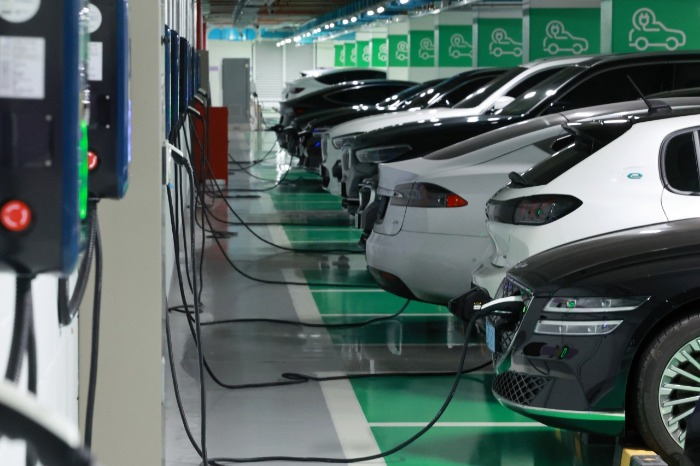Electric vehicles
EVs in S.Korea exceed 500,000
300,000 EV chargers were deployed in the nation, with an average of 9.8 hours for a full charge
By Apr 02, 2024 (Gmt+09:00)
1
Min read
Most Read
LG Chem to sell water filter business to Glenwood PE for $692 million


KT&G eyes overseas M&A after rejecting activist fund's offer


Kyobo Life poised to buy Japan’s SBI Group-owned savings bank


StockX in merger talks with Naver’s online reseller Kream


Meritz backs half of ex-manager’s $210 mn hedge fund



The cumulative number of electric vehicles (EVs) registered in South Korea exceeded 500,000 last year.
The number of EV chargers supplied domestically surpassed 300,000 units for the first time. This means that about 1.8 electric vehicles are using one charger.
However, the growth rates of EVs and chargers have slowed down in the past two years.
According to the Korea Automobile Manufacturers Association (KAMA), the Ministry of Land, Infrastructure and Transport, and the Integrated Zero Emission Vehicle Portal, the cumulative number of electric vehicle registrations from 2017 when official electric vehicle statistics began last year reached 543,900 units, showing a 39.5% increase compared to 389,855 units in 2022.
The cumulative number of EVs reached 134,962 units in 2020, surpassing 100,000 units for the first time, and has shown an annual growth of around 100,000 units or more since then.
The growth rate of electric vehicles last year decreased by 29.0 percentage points compared to 68.5% in 2022.
The trend of charger distribution domestically is similar to that of EVs.
The number of chargers supplied until last year totaled 305,309 units, surpassing 300,000 units for the first time. Of these, 270,923 were slow chargers, and 34,386 were fast chargers.
Compared to 205,205 units in 2022, the number of chargers supplied last year increased by 48.8%. However, the growth rate of chargers decreased by 43.5 percentage points from 92.3% in the previous year.
While the number of EVs and chargers increases by about 100,000 units per year, the growth trend has shown signs of slowing down in the past two years.
As charging facilities continue to be strengthened, the "vehicle-to-charger ratio," which represents the number of electric vehicles per charger, has gradually decreased.
Except for 2017 when the number of electric vehicle registrations was only around 25,000 units, from 2018, the ratio of about 2 electric vehicles per charger was recorded, followed by 1.90 units in 2022 and 1.78 units last year.
The Hyundai Motor Co. 's IONIQ 5, which recorded the highest number of registrations in the country, was 70,756 units. The average battery capacity of seven IONIQ models was 71.89 kWh.
Write to Jae-Fu Kim at hu@hankyung.com
More to Read
-
 Electric vehiclesHyundai to nearly double ultra-fast EV chargers by 2024
Electric vehiclesHyundai to nearly double ultra-fast EV chargers by 2024Mar 24, 2024 (Gmt+09:00)
2 Min read -
 Electric vehiclesLG Elec showcases EV chargers optimized for various spaces
Electric vehiclesLG Elec showcases EV chargers optimized for various spacesMar 06, 2024 (Gmt+09:00)
1 Min read -
 AutomobilesElectric vehicles in S.Korea beat diesel cars in sales
AutomobilesElectric vehicles in S.Korea beat diesel cars in salesFeb 10, 2023 (Gmt+09:00)
1 Min read -
 AutomobilesHyundai Motor sells 1 mn electric vehicles worldwide
AutomobilesHyundai Motor sells 1 mn electric vehicles worldwideJan 25, 2023 (Gmt+09:00)
1 Min read -
 Electric vehiclesKorean refiners: Lubricating the future of electric vehicles
Electric vehiclesKorean refiners: Lubricating the future of electric vehiclesApr 17, 2022 (Gmt+09:00)
2 Min read
Comment 0
LOG IN


